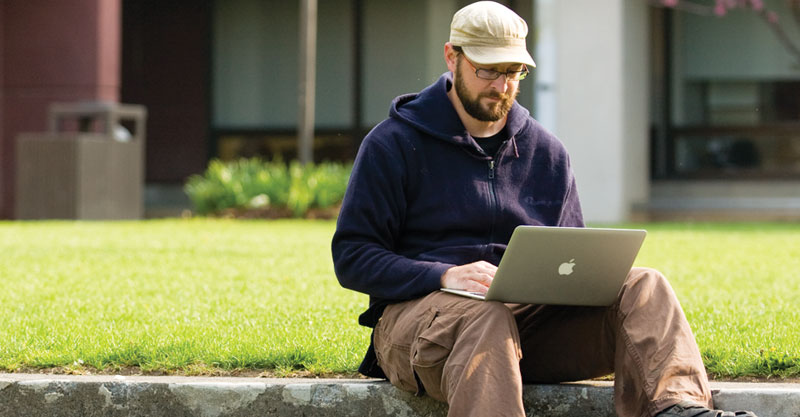
Ah, the internet… something almost every college student relies on every day. The average student uses the web for about 100 minutes each day for tasks like writing a paper, creating power point presentations and spread sheets, academic research, and even watching tutor videos on YouTube. With no surprise, researchers have estimated that some college students spend so much time online that their usage meets criteria for addiction.
With all of that time connected to the online world, the risk of danger is sure to be present. Hacking has become a major issue throughout the world, affecting not only average Americans but also corporations and governments organizations. As of May, about 110 million Americans were hacked in 2014 alone. Earlier this year, a countless number of internet users even experienced major security breaches from a rare encryption hack known as “Heartbleed“.
Are you concerned? Well have no fear because here are 10 Ways to Protect Your Identity Online:
1. Have a Strong Password
Using a password like your name with a favorite number attached is the first thing a hacker will check. Make sure you use something that isn’t too personal or obvious. You can also start by making your password longer than usual. Having a password that is unique and incorporates a variety of different symbols, numbers and letters is great first step to prevent hacking– just make sure you can remember it! If you need help remembering all of your accounts, there’s plenty of tools available to help manage your numerous passwords.
2. Do your research
Make sure that you research the program/software before you download it to your computer. Sometimes you don’t know if a download can harmful to your computer. Also, always be aware of email hacks. If you don’t recognize someone who emailed you, look them up on Google before you click any links inside the email. By doing some extra research you might just be saving yourself from a computer nightmare and a virus you don’t want.
3. Check your phone’s settings
Be aware of your privacy and location settings on your mobile phone. If you don’t need the GPS tool, turn it off to keep your whereabouts private. Also, don’t go connecting to every wi-fi signal in reach if you don’t need it. Using a free wi-fi network can be a big risk by making your phone noticeable to hackers and potentially give them access to the data on it. Instead, stick to the 4G signals to check your email or Facebook feed. And never bank or shop on a free wi-fi signal.
4. Use a trusted anti-virus program
Anti-virus programs usually protect about 95% of your computer. Just make sure it’s a trusted program with full protection so that you’re not wasting your money on software that won’t be of any use.
5. Keep your computer up to date
While you might have an anti-virus program for your computer, it is still very important to constantly make sure it’s up to date. Yes, I know it can be annoying taking time off from your Facebook to constantly keep updating your anti-virus program, but you’ll be better off knowing your personal files are safe.
6. Avoid online contests/sweepstakes
I’m sorry, but you most likely didn’t win $500,000 for no reason. I know winning something you didn’t have to pay for can be great, but it’s usually a scam. It’s a way for hackers to obtain information from people by manipulating them and saying that they randomly won something.
7. Use secure websites when shopping
When shopping or inputting personal information of any kind, be sure the website you are visiting is secure. Look for the “https://” in the address bar, or a padlock icon in the lower corner to indicate that the your information is encrypted and hidden from public view.
8. Don’t share personal information
Sharing your personal information through social media sites is something you should avoid. You should never display any information like your social security number or your parents maiden name. Once its online, it stays there!
9. Switch it up
Be sure to always change passwords every few months. Even though you might have a strong password it might be smart to switch it up from time to time so that you keep intruders one step behind.
10. Set up your two-factor verification
Some services like Twitter or Google+ offer this type of password system that you have to set up manually. It requires you to enter a second code, which you can only get via text or a voice call. This provides extra security for your accounts.




Internet made our way of communication so easy but there too many risks to go online be aware about the dark side of the internet everyone can be safe thanks for these kinda articles they really teach us the effective ways to be safe. I just wanna say your one wrong step on internet can make a big difference be safe while you are browsing
“… Have a Strong Password …” While this seems obvious, it is useless once server security at the point of access is breached. Each year probably billions of passwords are stolen worldwide. We only hear about the most spectacular cases involving e.g. banks or governments etc. However: this need not happen at all. The problem is that for reasons best known to the sloven providers, they store the original passwords instead of a mathematically calculated hash. If only the hash were stored and then compared tom the re-calculated hash off the password at the time of access/identification, NOT ONE such breach would occur worldwide! The hash cannot be retranslated back into the original password so that unless the password is intercepted (which should not happen if SSL/https were implemented correctly) or the user is careless there is no way a password can be compromised again.